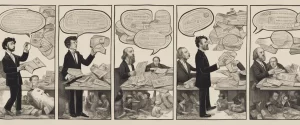——The Rational Optimist by Matt Ridley & A Troublesome Inheritance by Nicholas Wade

Books have always played a crucial role in shaping our perceptions, challenging long-held beliefs, and pushing intellectual frontiers. Two such books, “The Rational Optimist” by Matt Ridley and “A Troublesome Inheritance” by Nicholas Wade, delve into the intricate complexities of human nature, evolution, and societal progress. Although these books delve into distinct domains, they share an underlying interest in unraveling the factors that have shaped our present reality and contemplating the prospects of our collective future. This comparative study aims to explore the overarching themes, arguments, and methodologies used by these authors, highlighting both their points of agreement and divergence, thereby providing a comprehensive analysis of their respective contributions to the discourse surrounding human evolution and social progress.
The Rational Optimist” and “A Troublesome Inheritance” tackle profound questions with regards to human nature, the development of societies, and the forces that have driven our progress throughout history. Matt Ridley, a renowned science writer, argues for the triumph of human collaboration, trade, and specialization as the key drivers behind human civilization’s advancement. Ridley posits that the exchange and subsequent cumulative progress of ideas and knowledge have been central to boosting well-being, and he presents a compelling case for the power of trade and globalization in fostering human prosperity.
On the other hand, Nicholas Wade, a science journalist, delves into the realm of genetics and explores the intricate relationship between evolutionary forces and cultural differences among human populations. “A Troublesome Inheritance” contends that genetic variations among populations have played a significant role in shaping cultural outcomes and societal structures. Wade’s arguments engender heated discussions on the controversial topic of race and tend to challenge prevailing notions about equality and disparity among different ethnic groups.
While these books span different subject matters and employ different methodologies, they converge on their exploration of the factors underpinning human progress and societal complexities. This comparative analysis aims to peel back the layers of each book’s arguments, evaluate their strengths and weaknesses, and shed light on the implications of their findings for our understanding of human nature, evolution, and societal development.
By undertaking this comparative study, we seek to unravel the synergies and disparate viewpoints present in Ridley’s “The Rational Optimist” and Wade’s “A Troublesome Inheritance.” Through a critical analysis, we aim to contribute to the broader dialogue on the forces that have sculpted human civilization while fostering a nuanced understanding of the potential trajectories of our collective future.
Brief Summary of Two Books
The Rational Optimist by Matt Ridley
“The Rational Optimist” by Matt Ridley is a thought-provoking book that argues against the prevailing pessimistic worldview and explores the progress and prosperity of humanity throughout history. Ridley’s main thesis is that human advancement and economic prosperity are the direct result of specialization, exchange, and innovation, facilitated by the collective human brain. He delves into various aspects such as economics, technology, culture, and our innate human nature to explain why optimism is rational. Ridley challenges conventional wisdom by highlighting how humans have thrived and improved their living conditions over time, despite facing numerous challenges. He explores key historical events, trends, and scientific discoveries to support his claims. Ridley’s central argument is that the “collective human intelligence” constantly finds ways to overcome obstacles and enhance well-being, ultimately improving the quality of life for people around the world. Emphasizing the power of trade and technological progress, Ridley encourages readers to embrace optimism based on historical evidence and the potential for continued human progress.
A Troublesome Inheritance by Nicholas Wade
A Troublesome Inheritance” by Nicholas Wade is a book that explores the role of genetics in shaping human behavior and society. The central argument proposed in the book is that genetic differences between human populations have played a significant role in shaping cultural and societal differences observed throughout history. Wade presents scientific evidence that supports the idea that human evolution has not only been driven by natural selection but also by cultural evolution, which has allowed some populations to adapt to their surroundings more efficiently.
The author discusses various genetic traits such as intelligence, aggression, and social behavior, and how they may have been influenced by natural selection and genetic variation. Wade argues that genetic differences among different human groups can explain different levels of economic development, social structures, and political systems observed across different societies around the world.
Wade also delves into the controversial and sensitive subject of race and genetics, attempting to draw connections between genetic variation and racial differences. He explores the evolutionary history of human populations and how genetic adaptations to local environments may have shaped racial differences. However, it is important to note that these insights are not without criticism and have been met with opposition by many scientists and scholars who assert that such arguments can promote discrimination and reinforce harmful stereotypes.
Overall, “A Troublesome Inheritance” presents a provocative perspective on the complex interplay between genetics, culture, and human society. While the book offers an interesting analysis of the potential impact of genetic variation on human behavior and society, it is crucial to approach the topic critically and consider the diverse range of perspectives on this inherently controversial subject.
Comparison between Two Books

Similarities in anthropology
Both “The Rational Optimist” by Matt Ridley and “A Troublesome Inheritance” by Nicholas Wade touch upon anthropology in their exploration of human development and progress. Despite their different primary focuses, there are notable similarities in their discussions of anthropology.
1. Evolutionary Perspective: Both books adopt an evolutionary perspective when examining human history and development. Ridley and Wade acknowledge the role of biological evolution in shaping human nature and behavior. They argue that our ancestors’ genetic traits and social behaviors have contributed to our current state.
2. Cultural Evolution: Ridley and Wade emphasize the concept of cultural evolution as an integral part of human progress. They explore how cultural traits and practices have evolved over time, shaping societies and influencing individual behaviors and outcomes. They argue that these cultural shifts have played a significant role in the advancement of human civilizations.
3. Human Cooperation: Both books delve into the importance of human cooperation and its evolutionary origins. They discuss how cooperation, through reciprocal altruism and the formation of social networks, has been central to human success and progress. Ridley and Wade argue that societies that have embraced cooperation and division of labor have thrived throughout history.
4. Genetic Influences on Behavior: Ridley’s “The Rational Optimist” and Wade’s “A Troublesome Inheritance” explore the influence of genetics on human behavior. Ridley emphasizes the impact of genes on individual success and argues that market exchange and innovation are rooted in our genetic predispositions. Similarly, Wade touches upon the genetic basis of human behavior, including aspects such as aggression, intelligence, and social organization, and how these traits have contributed to the development of different societies.
5. Anthropological Debates: Both authors engage with and contribute to ongoing debates within anthropology. Ridley and Wade challenge certain prevailing ideas or interpretations while proposing alternative explanations. They question the extent to which cultural evolution can override genetic influences and discuss the intertwined relationship between genes, human behavior, and social structures.
While these books approach anthropology from different angles, they share common ground in acknowledging the evolutionary basis of human society and the crucial role of culture and genetics in shaping our past and present.
Divergences in anthropology
The Rational Optimist by Matt Ridley and A Troublesome Inheritance by Nicholas Wade both explore different aspects of anthropology but with diverging perspectives and conclusions. While both books touch on the topic of human evolution and its impact on societies, they approach the subject matter from disparate angles.
In The Rational Optimist, Matt Ridley examines the history of human progress and argues that trade and specialization have been the driving forces behind the development of civilization. Ridley emphasizes the importance of cultural exchange and explains how societal cooperation and the exchange of ideas have led to vast improvements in living standards and overall well-being. For Ridley, the diversity and adaptability of human cultures have been key to the continued progress of our species.
On the other hand, A Troublesome Inheritance by Nicholas Wade examines human evolution through a genetic lens. Wade focuses on the genetic differences between populations and how they contribute to variations in behavioral traits and social structures. The book suggests that particular genetic variations may be responsible for different levels of social organization and cultural achievements among various demographic groups. Wade argues that these genetic differences have likely contributed to the varying levels of economic and technological development observed across human societies.
The primary divergence between these books lies in their explanations for the development of human societies. Ridley emphasizes the role of cultural exchange and economic factors, suggesting that human progress is primarily driven by cultural adaptation and the exchange of ideas. In contrast, Wade’s perspective places a greater emphasis on genetic factors, proposing that genetic variations have directly influenced the development of different societal structures and cultural achievements.
Additionally, the books differ in terms of their reception within the scientific community. While The Rational Optimist has generally received positive reviews for its well-reasoned arguments, A Troublesome Inheritance has faced criticism for its interpretations of genetic data and the potential for racial and cultural essentialism.
In summary, while both The Rational Optimist and A Troublesome Inheritance touch on anthropology and human evolution, they diverge significantly in their perspectives and conclusions. Ridley emphasizes cultural exchange and cooperation as the driving forces behind human progress, whereas Wade focuses on genetic differences and their influence on societal development.

Conclusion
Both “The Rational Optimist” by Matt Ridley and “A Troublesome Inheritance” by Nicholas Wade are highly regarded books, but they explore different topics and may appeal to different readers based on their interests. Here is a brief overview of each book to help you make an informed decision:
1. “The Rational Optimist” by Matt Ridley: This book presents a positive outlook on human progress and argues that trade and innovation have led to an improvement in living standards over time. Ridley discusses how markets, technology, and specialization have played a crucial role in this progress. He also explores the concept of human cooperation and the economic and social benefits it brings. If you are interested in understanding ways in which human society has improved overall and the reasons behind it, this book may be worth reading.
2. “A Troublesome Inheritance” by Nicholas Wade: This book delves into the intersection between genetics, race, and human history. Wade presents evidence suggesting that genetic factors have played a role in shaping various human traits, including behavior and social organization. He explores controversial topics such as racial differences and argues that some genetic variations have contributed to different societal achievements and struggles. If you are interested in understanding the role genetics may have played in shaping human history and the implications it may have for our understanding of race, this book may be worth reading.
Ultimately, the choice between the two books depends on your personal interests and the specific topic you would like to explore further.



